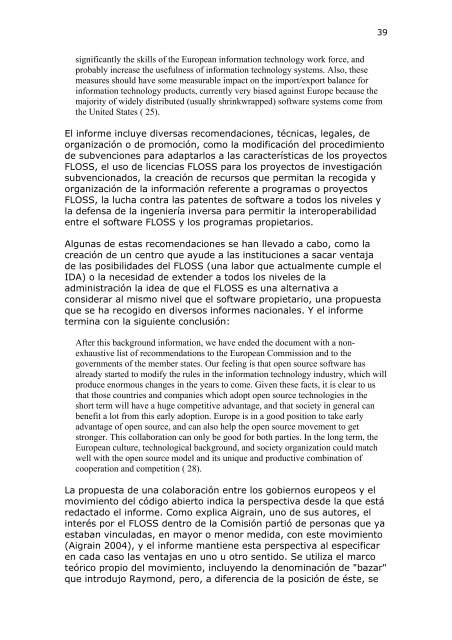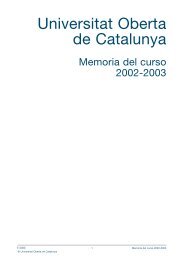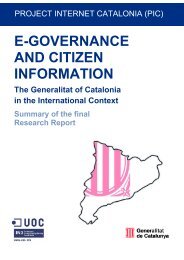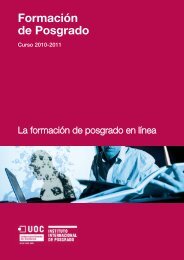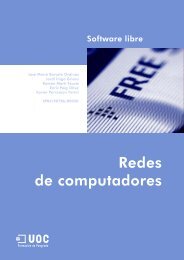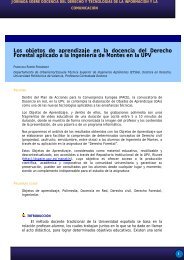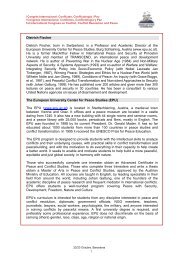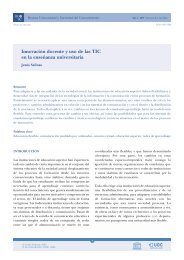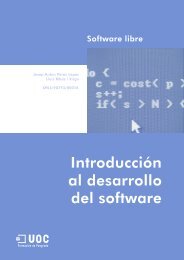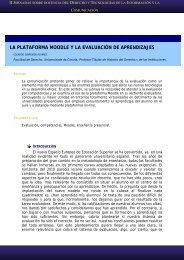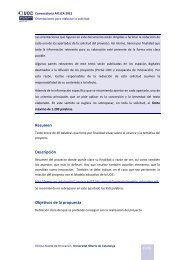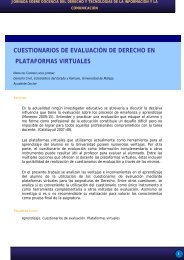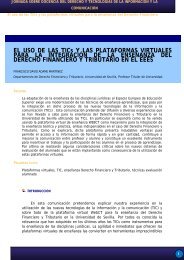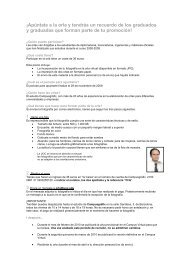El uso del software libre en las administraciones públicas de la UE
El uso del software libre en las administraciones públicas de la UE
El uso del software libre en las administraciones públicas de la UE
You also want an ePaper? Increase the reach of your titles
YUMPU automatically turns print PDFs into web optimized ePapers that Google loves.
39significantly the skills of the European information technology work force, andprobably increase the usefulness of information technology systems. Also, thesemeasures should have some measurable impact on the import/export ba<strong>la</strong>nce forinformation technology products, curr<strong>en</strong>tly very biased against Europe because themajority of wi<strong><strong>de</strong>l</strong>y distributed (usually shrinkwrapped) <strong>software</strong> systems come fromthe United States ( 25).<strong>El</strong> informe incluye diversas recom<strong>en</strong>daciones, técnicas, legales, <strong>de</strong>organización o <strong>de</strong> promoción, como <strong>la</strong> modificación <strong><strong>de</strong>l</strong> procedimi<strong>en</strong>to<strong>de</strong> subv<strong>en</strong>ciones para adaptarlos a <strong><strong>la</strong>s</strong> características <strong>de</strong> los proyectosFLOSS, el <strong>uso</strong> <strong>de</strong> lic<strong>en</strong>cias FLOSS para los proyectos <strong>de</strong> investigaciónsubv<strong>en</strong>cionados, <strong>la</strong> creación <strong>de</strong> recursos que permitan <strong>la</strong> recogida yorganización <strong>de</strong> <strong>la</strong> información refer<strong>en</strong>te a programas o proyectosFLOSS, <strong>la</strong> lucha contra <strong><strong>la</strong>s</strong> pat<strong>en</strong>tes <strong>de</strong> <strong>software</strong> a todos los niveles y<strong>la</strong> <strong>de</strong>f<strong>en</strong>sa <strong>de</strong> <strong>la</strong> ing<strong>en</strong>iería inversa para permitir <strong>la</strong> interoperabilidad<strong>en</strong>tre el <strong>software</strong> FLOSS y los programas propietarios.Algunas <strong>de</strong> estas recom<strong>en</strong>daciones se han llevado a cabo, como <strong>la</strong>creación <strong>de</strong> un c<strong>en</strong>tro que ayu<strong>de</strong> a <strong><strong>la</strong>s</strong> instituciones a sacar v<strong>en</strong>taja<strong>de</strong> <strong><strong>la</strong>s</strong> posibilida<strong>de</strong>s <strong><strong>de</strong>l</strong> FLOSS (una <strong>la</strong>bor que actualm<strong>en</strong>te cumple elIDA) o <strong>la</strong> necesidad <strong>de</strong> ext<strong>en</strong><strong>de</strong>r a todos los niveles <strong>de</strong> <strong>la</strong>administración <strong>la</strong> i<strong>de</strong>a <strong>de</strong> que el FLOSS es una alternativa aconsi<strong>de</strong>rar al mismo nivel que el <strong>software</strong> propietario, una propuestaque se ha recogido <strong>en</strong> diversos informes nacionales. Y el informetermina con <strong>la</strong> sigui<strong>en</strong>te conclusión:After this background information, we have <strong>en</strong><strong>de</strong>d the docum<strong>en</strong>t with a nonexhaustivelist of recomm<strong>en</strong>dations to the European Commission and to thegovernm<strong>en</strong>ts of the member states. Our feeling is that op<strong>en</strong> source <strong>software</strong> hasalready started to modify the rules in the information technology industry, which willproduce <strong>en</strong>ormous changes in the years to come. Giv<strong>en</strong> these facts, it is clear to usthat those countries and companies which adopt op<strong>en</strong> source technologies in theshort term will have a huge competitive advantage, and that society in g<strong>en</strong>eral canb<strong>en</strong>efit a lot from this early adoption. Europe is in a good position to take earlyadvantage of op<strong>en</strong> source, and can also help the op<strong>en</strong> source movem<strong>en</strong>t to getstronger. This col<strong>la</strong>boration can only be good for both parties. In the long term, theEuropean culture, technological background, and society organization could matchwell with the op<strong>en</strong> source mo<strong><strong>de</strong>l</strong> and its unique and productive combination ofcooperation and competition ( 28).La propuesta <strong>de</strong> una co<strong>la</strong>boración <strong>en</strong>tre los gobiernos europeos y elmovimi<strong>en</strong>to <strong><strong>de</strong>l</strong> código abierto indica <strong>la</strong> perspectiva <strong>de</strong>s<strong>de</strong> <strong>la</strong> que estáredactado el informe. Como explica Aigrain, uno <strong>de</strong> sus autores, elinterés por el FLOSS d<strong>en</strong>tro <strong>de</strong> <strong>la</strong> Comisión partió <strong>de</strong> personas que yaestaban vincu<strong>la</strong>das, <strong>en</strong> mayor o m<strong>en</strong>or medida, con este movimi<strong>en</strong>to(Aigrain 2004), y el informe manti<strong>en</strong>e esta perspectiva al especificar<strong>en</strong> cada caso <strong><strong>la</strong>s</strong> v<strong>en</strong>tajas <strong>en</strong> uno u otro s<strong>en</strong>tido. Se utiliza el marcoteórico propio <strong><strong>de</strong>l</strong> movimi<strong>en</strong>to, incluy<strong>en</strong>do <strong>la</strong> d<strong>en</strong>ominación <strong>de</strong> "bazar"que introdujo Raymond, pero, a difer<strong>en</strong>cia <strong>de</strong> <strong>la</strong> posición <strong>de</strong> éste, se


